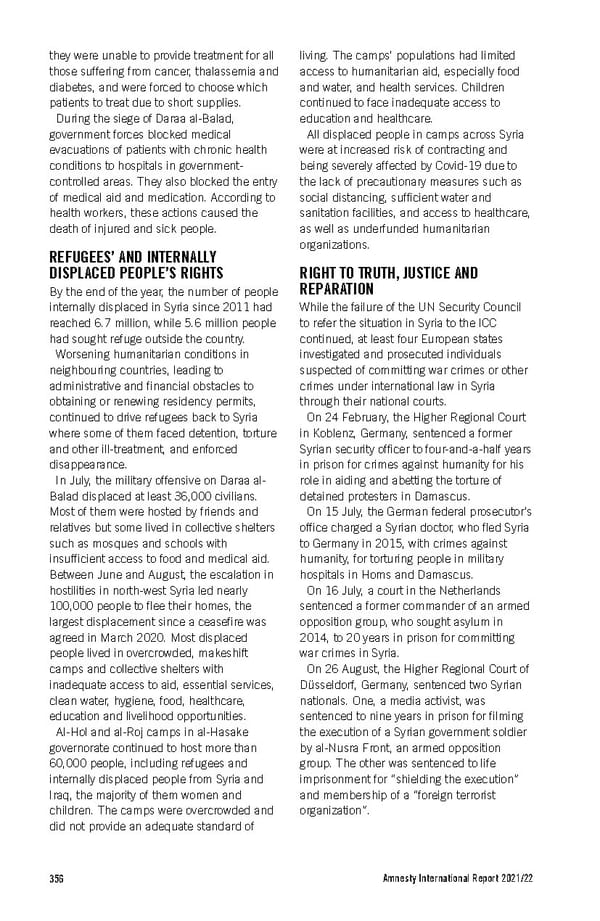they were unable to provide treatment for all living. The camps’ populations had limited those suffering from cancer, thalassemia and access to humanitarian aid, especially food diabetes, and were forced to choose which and water, and health services. Children patients to treat due to short supplies. continued to face inadequate access to During the siege of Daraa al-Balad, education and healthcare. government forces blocked medical All displaced people in camps across Syria evacuations of patients with chronic health were at increased risk of contracting and conditions to hospitals in government- being severely affected by Covid-19 due to controlled areas. They also blocked the entry the lack of precautionary measures such as of medical aid and medication. According to social distancing, sufficient water and health workers, these actions caused the sanitation facilities, and access to healthcare, death of injured and sick people. as well as underfunded humanitarian REFUGEES’ AND INTERNALLY organizations. DISPLACED PEOPLE’S RIGHTS RIGHT TO TRUTH, JUSTICE AND By the end of the year, the number of people REPARATION internally displaced in Syria since 2011 had While the failure of the UN Security Council reached 6.7 million, while 5.6 million people to refer the situation in Syria to the ICC had sought refuge outside the country. continued, at least four European states Worsening humanitarian conditions in investigated and prosecuted individuals neighbouring countries, leading to suspected of committing war crimes or other administrative and financial obstacles to crimes under international law in Syria obtaining or renewing residency permits, through their national courts. continued to drive refugees back to Syria On 24 February, the Higher Regional Court where some of them faced detention, torture in Koblenz, Germany, sentenced a former and other ill-treatment, and enforced Syrian security officer to four-and-a-half years disappearance. in prison for crimes against humanity for his In July, the military offensive on Daraa al- role in aiding and abetting the torture of Balad displaced at least 36,000 civilians. detained protesters in Damascus. Most of them were hosted by friends and On 15 July, the German federal prosecutor’s relatives but some lived in collective shelters office charged a Syrian doctor, who fled Syria such as mosques and schools with to Germany in 2015, with crimes against insufficient access to food and medical aid. humanity, for torturing people in military Between June and August, the escalation in hospitals in Homs and Damascus. hostilities in north-west Syria led nearly On 16 July, a court in the Netherlands 100,000 people to flee their homes, the sentenced a former commander of an armed largest displacement since a ceasefire was opposition group, who sought asylum in agreed in March 2020. Most displaced 2014, to 20 years in prison for committing people lived in overcrowded, makeshift war crimes in Syria. camps and collective shelters with On 26 August, the Higher Regional Court of inadequate access to aid, essential services, Düsseldorf, Germany, sentenced two Syrian clean water, hygiene, food, healthcare, nationals. One, a media activist, was education and livelihood opportunities. sentenced to nine years in prison for filming Al-Hol and al-Roj camps in al-Hasake the execution of a Syrian government soldier governorate continued to host more than by al-Nusra Front, an armed opposition 60,000 people, including refugees and group. The other was sentenced to life internally displaced people from Syria and imprisonment for “shielding the execution” Iraq, the majority of them women and and membership of a “foreign terrorist children. The camps were overcrowded and organization”. did not provide an adequate standard of Amnesty International Report 2021/22 356
 Amnesty International Report 2021/22 Page 355 Page 357
Amnesty International Report 2021/22 Page 355 Page 357